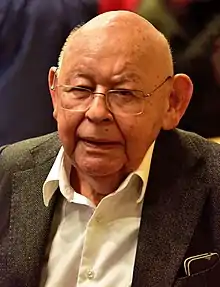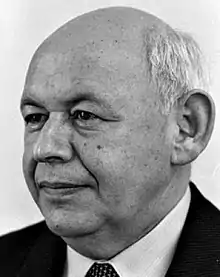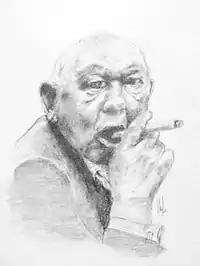Jerzy Urban
Jerzy Urban[2] (Polish pronunciation: [ˈjɛʐɨ ˈurban]) (born 3 August 1933 as Jerzy Urbach) is a Polish journalist, publicist, writer, politician, and video blogger. From 1981 to 1989, he was a spokesman for the communist Council of Ministers. From April to September 1989, he was a minister without portfolio and chairman of the Polish Radio and Television. From 1990 is the editor-in-chief of the weekly NIE and the owner of the Urma publishing company.
Jerzy Urban | |
|---|---|
 Jerzy Urban (2019) | |
| Born | Jerzy Urbach 3 August 1933 Łódź, Poland |
| Nationality | Polish-Jewish |
| Other names | Jerzy Kibic, Jan Rem, Jerzy Urbach |
| Occupation | Journalist, writer, politician |
| Net worth | PLN 120 million (2004)[1] |
| Political party | Polish United Workers' Party (1989–1990)
Social Democracy of the Republic of Poland (1990–1999) Democratic Left Alliance (1999–2004) |
| Signature | |
 | |


Biography
Before 1989
He was born into an assimilated Polish-Jewish family in Łódź. His father was a journalist and activist of the Polish Socialist Party as well as the Bund.
He spent his early childhood in Łódź. He lived at 134 Piotrkowska Street, in a transverse outbuilding on the first floor. In the autumn of 1939 he moved with his family to Lviv. Jerzy's father received an engineer job at the State Institute of City Design. The whole family adopted Soviet citizenship. During this time, the family officially changed the name from "Urbach" to "Urban". After German invasion of the Soviet Union, they had to hide in the Eastern Borderlands. Initially, they stayed in the village of Budaniv near Terebovlia, later in Ternopil.[3] From 1944 they lived first in Chełm, then in Lublin. They returned to Łódź at the beginning of 1945.
After the end of the war, Jerzy Urban attended seventeen different primary and secondary schools. In 1948 he joined the Union of Polish Youth, of which he was an active member. From 1951 to 1954 he was studied journalism at the University of Warsaw, but did not graduate.[3]
In 1951 he began journalistic career. In July 1955 he became a journalist of the weekly "Po prostu". From January 1956 he was the head of the political department. After the liquidation of the weekly, Urban was officially banned from publishing under his name. From 1961 he worked in "Polityka", when he wrote under Pseudonyms. In 1963 he was banned from working in journalism. After some time, Zenon Kliszko, who was then Gomułka's right hand, allowed him to take up a job provided he did not disclose himself. The ban on journalistic work for Jerzy Urban was officially withdrawn only after Władysław Gomułka's departure from power. After some time, despite remaining independent, he assumed the position of head of the national department of "Polityka".
Despite his critical attitude towards Edward Gierek's rule, he was an opponent of the Solidarity movement in 1980 and often criticized its leaders (including Lech Wałęsa).
From 1981 to 1989, he was a spokesman for the Council of Ministers.[4] He created the tradition of weekly press conferences, transmitted by the Polish television and attended by both Polish and foreign journalists.[4] He criticized the priest Jerzy Popiełuszko as an anti-communist Savonarola.[5]
In 1986 Urban masterminded a media story that the United States had betrayed the Solidarity movement. He met with a Washington Post reporter and told him that a Polish spy for the CIA, who was later identified as Ryszard Kukliński, was aware of the plan to install martial law in 1981 and had passed that information on to Washington. "The US administration could have publicly revealed these plans to the world and warned Solidarity," Urban said, "Had it done so, the implementation of martial law would have been impossible."[6] At press conference Urban alleged that "Washington ... did not warn its allies. It did not boast of its agent as it customarily does." According to Urban, the Reagan administration had "lied to its own people and to its friends in Poland," when it denied having prior knowledge of martial law.
He did not protest against the campaign against homosexuals in the 1980s. In 1986, when asked about the Operation Hyacinth in an interview with the American press, he denied that it ever took place.[7]
From April to September 1989, he was a minister without portfolio and chairman of the Polish Radio and Television.
From 1989 to 1990, he was a member of the Polish United Workers' Party.[3] In 1989 Polish legislative election he unsuccessfully ran for the Sejm as an independent candidate. He eventually obtained around 34,000 votes.[8] Since then, he has never tried to be an active politician.
After 1989
From 1990 to 1999, he was a member of the Social Democracy of the Republic of Poland. From 1999 to 2004, he belonged to the Democratic Left Alliance. In 1990 he became the editor-in-chief of the political and scandalous weekly "NIE".[4] After 2002 it began to criticize the cabinet of Leszek Miller and the presidency of Aleksander Kwasniewski.
In 2003, he testified before the parliamentary commission of inquiry into the Rywin affair, publicly accusing Leszek Miller of tolerating corruption in his immediate environment.[9] He knew about the scandal before its disclosure, he was informed by Adam Michnik.[9]
Since 2012, he has been running the official "NIE" weekly channel on YouTube, posting comedy content on it. He gained great popularity.[10]
Personal life and views
Urban married three times.[4] He has one daughter. He describes himself as an atheist.[11]
References
- "Jerzy Urban – emeryt i milioner". Praca. 21 March 2012. Archived from the original on 25 October 2014. Retrieved 28 October 2014.
- also known as: Jerzy Kibic, Jan Rem, Wanda Borkowicz, Klakson
- "Biuletyn Informacji Publicznej Instytutu Pamięci Narodowej". katalog.bip.ipn.gov.pl. Retrieved 5 January 2020.
- Lawrence Weschler (11 December 1995). "Urban Blight". The New Yorker: 54. Retrieved 28 October 2014.
- Jan Rem, Seanse Nienawiści, „Tu i Teraz", 19 września 1984
- Bob Woodward and Michael Dobbs, "CIA had Secret Agent on Polish General Staff," The Washington Post, 4 June 1986, p. A1.
- "Wokół akcji Hiacynt – Co zrobić z "rózowymi kartotekami"?". queer.pl (in Polish). Retrieved 5 January 2020.
- "Jak Jerzy Urban do Sejmu kandydował". PolskieRadio24.pl. Retrieved 5 January 2020.
- Macieja, Dorota; Gajewski, Jarosław (16 March 2003). "Urbanem w Millera". Wprost (in Polish). Retrieved 5 January 2020.
- "Tygodnik NIE". Retrieved 5 January 2020 – via YouTube.
- "Urban znów szokuje: oszukałem Kościół!". Wiadomosci. Archived from the original on 16 October 2014. Retrieved 28 October 2014.
- "Jerzy Urban: biografia, ciekawostki, cytaty". Biografia24.pl (in Polish). 22 June 2013. Retrieved 5 January 2020.
